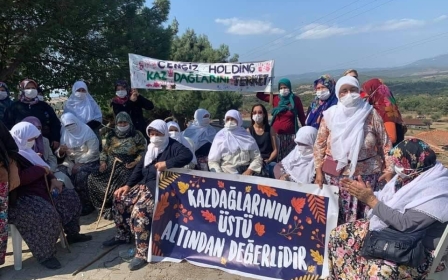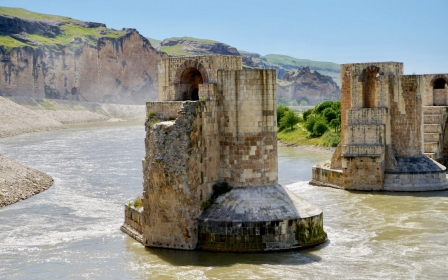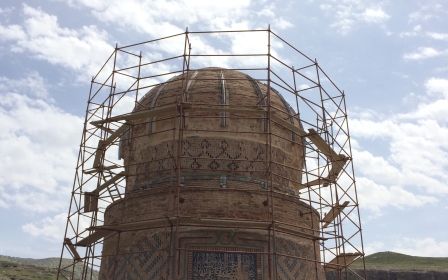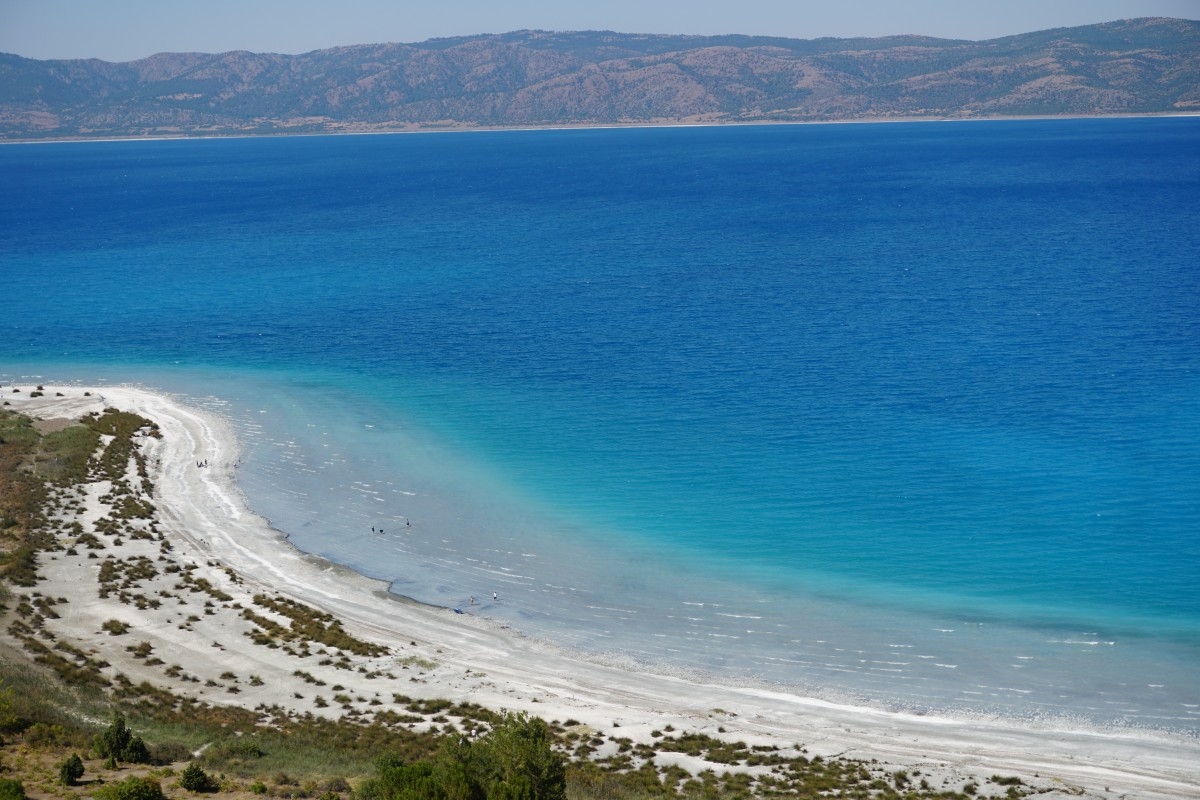
In pictures: Does Turkey's Lake Salda hold the key to life on Mars?
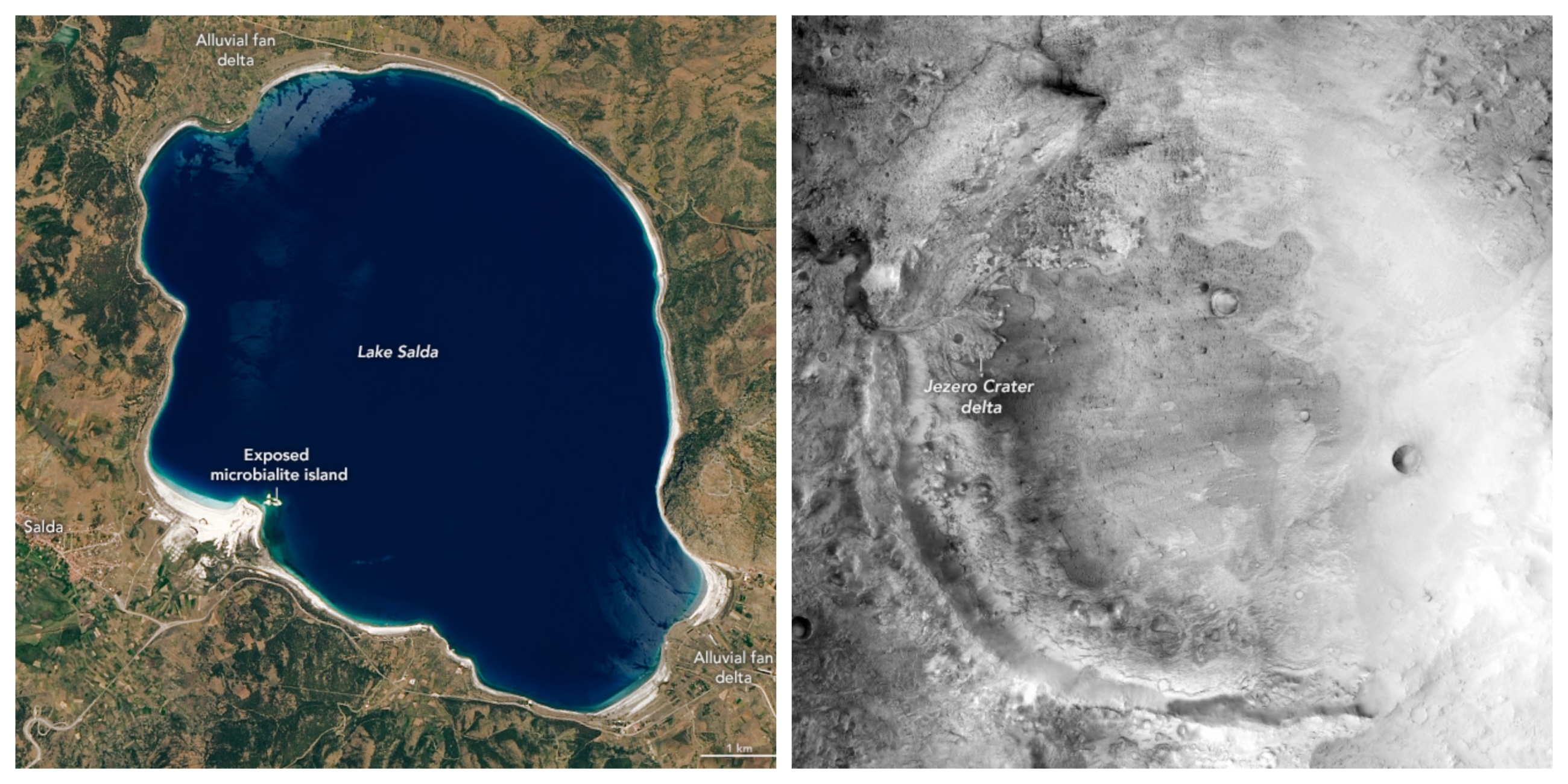
Popularly dubbed “the Maldives” because of its bright azure waters and expansive white shores, Lake Salda in Turkey’s southwestern Burdur province holds much more than meets the eye. Due to its mineral composition and geology, this unique tectonic lake resembles the Jezero Crater on Mars, NASA says, as they prepare to use the findings in their research. (Image credit: NASA)
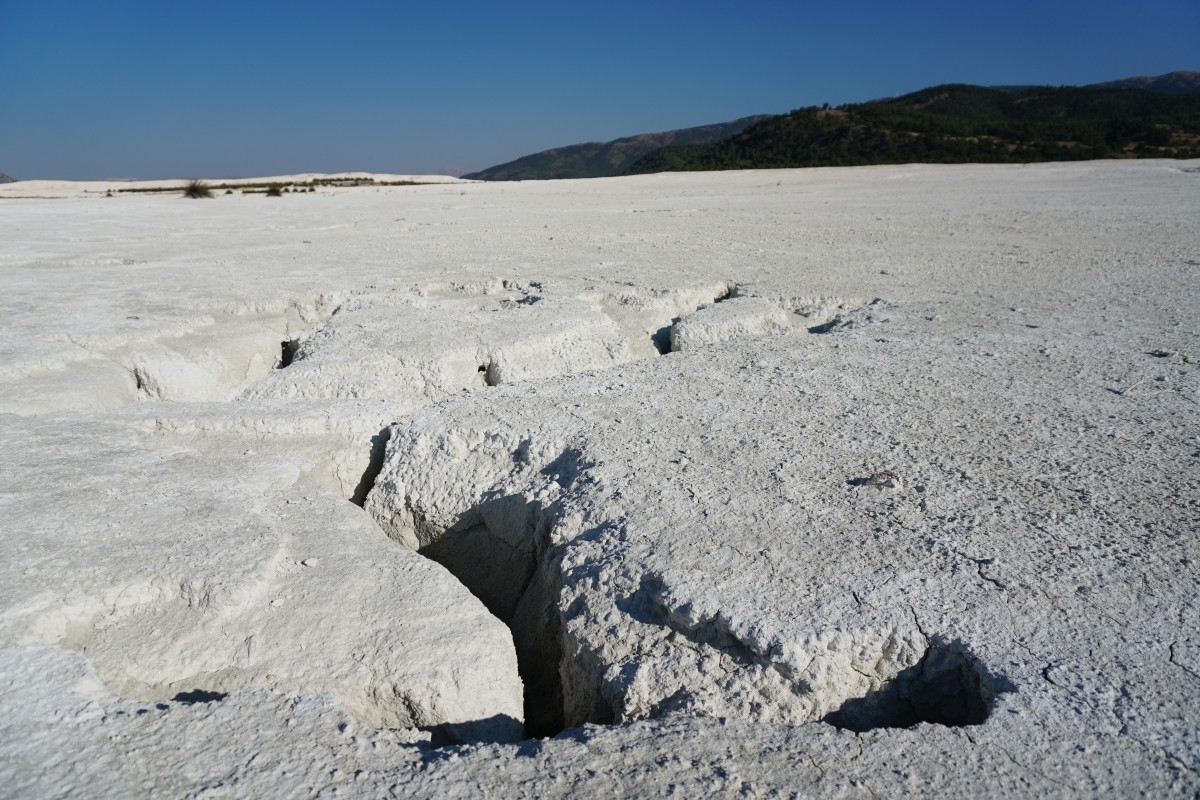
The day after the launch of the Mars 2020 Perseverance Rover (nicknamed "Percy") on 30 July, NASA’s Earth Observatory announced that “researchers are using their understanding of Lake Salda (above) to help guide the Mars 2020 mission, which will drop the Perseverance rover into the crater to search for signs of ancient life."
Jezero, a 45-km wide “ancient impact crater” located in the northwest corner of a larger impact basin on the Red Planet is noteworthy, NASA said, because it once contained a lake, as evidenced by delta deposits. “It just so happens that Lake Salda is the only known lake on Earth that contains the carbonates and depositional features [deltas] similar to those found at Jezero Crater.” (MEE/Nimet Kirac)
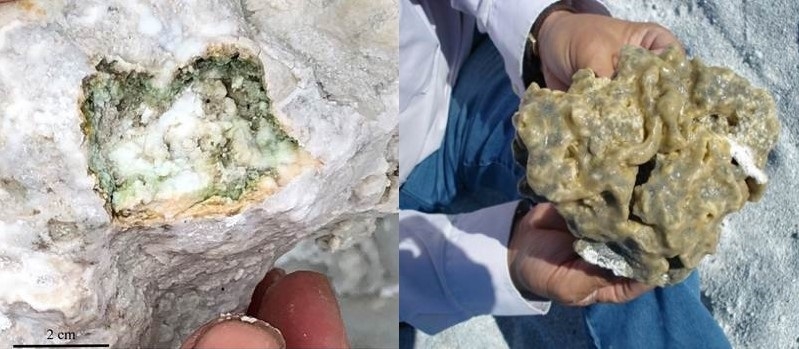
Turkey’s director for NASA’s cooperated studies on Lake Salda, Professor Nurgul Celik Balci, told MEE, that “so far, Perseverance already gathered data from Mars seven or eight times,” noting that the current trip’s finds will include material from the mysterious Martian landscape to compare with our own planet.
“The microbial communities in the lake [Salda] will help search for traces of ancient life on Mars,” Balci said, while presenting examples of microbial communities that develop on carbonates (above).
NASA expects the rover to land on Jezero by mid-February and Balci is optimistic that they will soon "be able to weigh the samples together and have a clearer understanding in our quest to find ancient life signs". (Image credit: Istanbul Technical University Geology Dept)
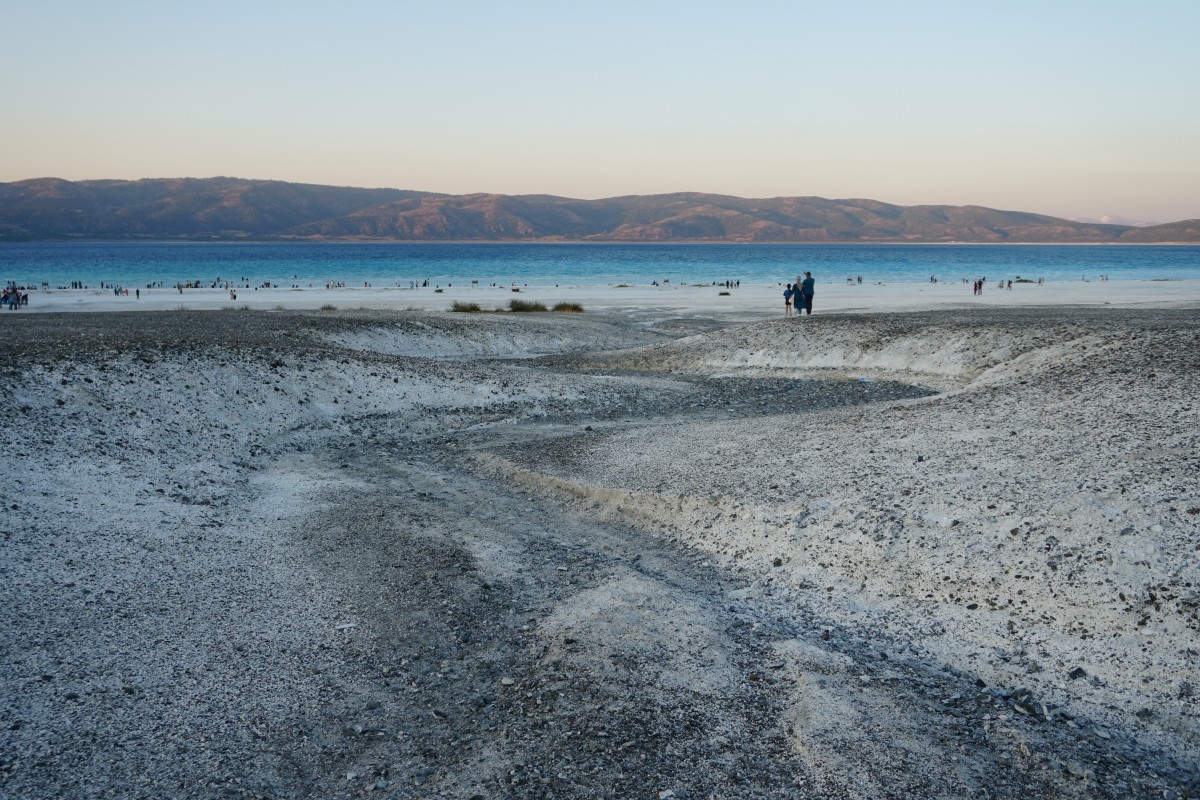
Carbonates rich in magnesium establish the resemblance between the two planets’ lakes despite coming from marginally different time periods, says Balci. “We know that the Jezero rocks were formed around 3.5-4 billion years ago. On the other hand, Salda’s formation dates back around 2,000,000 years,” Balci said. “Here, we’re looking for meaningful correlations [between two planets].” (MEE/Nimet Kirac)
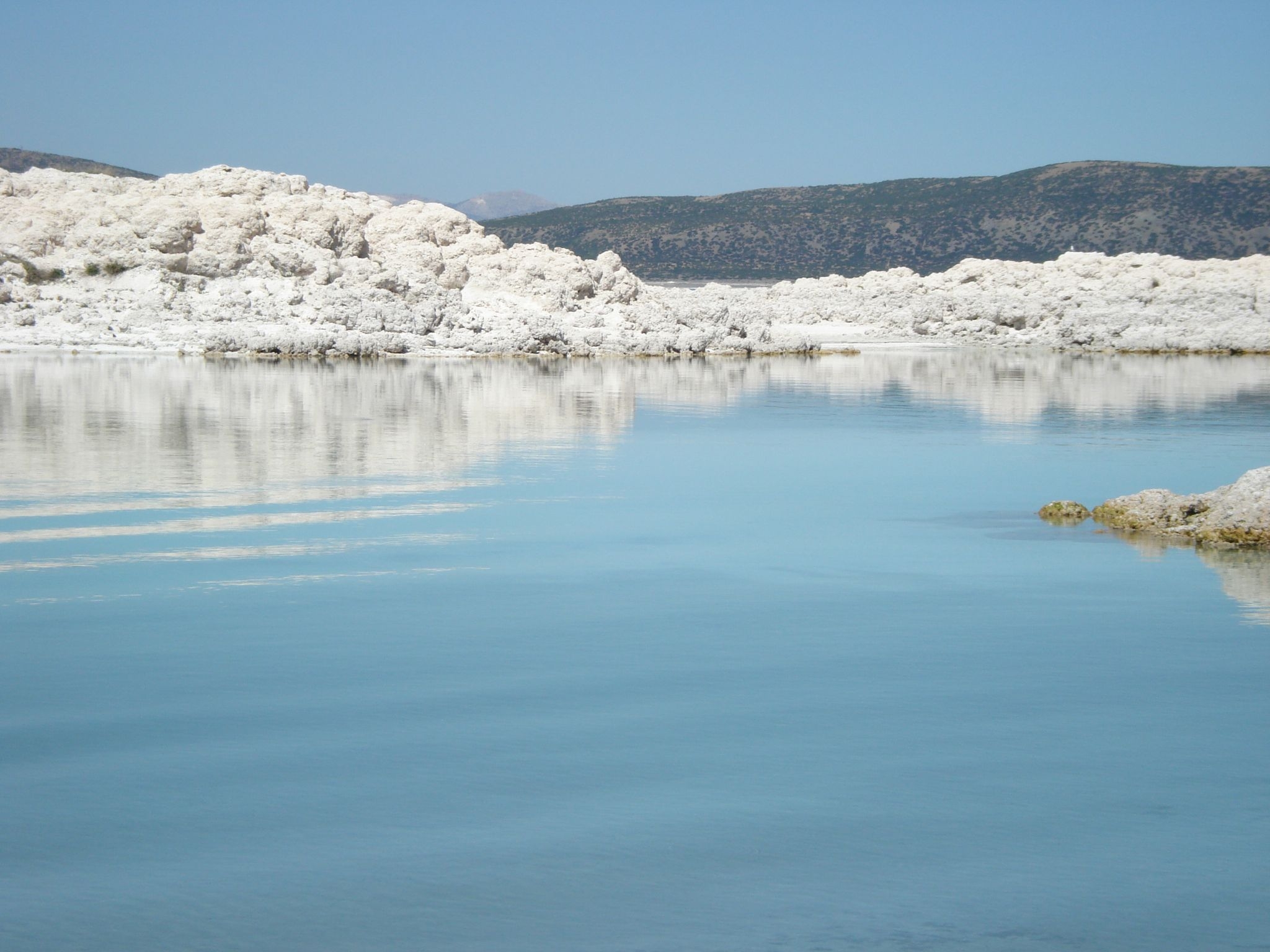
Turkey’s deepest lake, with a depth of 185 metres in parts, Salda is a unique, giant “natural laboratory,” Balci said, at a time when researchers are seeking answers to humanity’s extraterrestrial curiosities.
Although there are natural formations in Australia and Canada that bear similar organo-sedimentary structure, stramolites, Salda is uniquely similar to Mars petrographically - in other words, similar in the ways its rocks were formed. “There is an ecological balance to this lake... We must preserve it as best we can,” Balci said. (Image credit: Professor Nurgul Celik Balci)
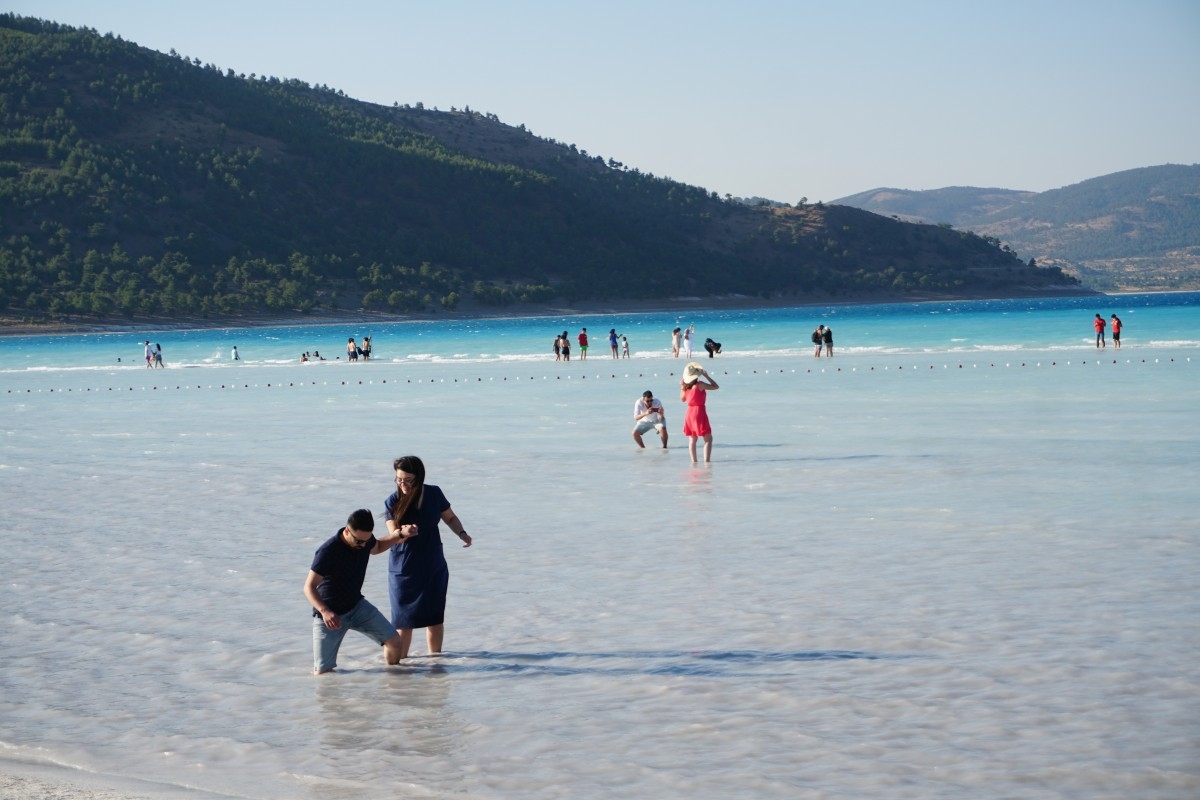
In addition to being a scientific anomaly, Lake Salda is also a popular tourist destination in Turkey. Visitors quickly realise that this is not a normal lake, as the thick delta deposits mean the composition of the lakebed is denser than usual. Despite its Maldives nickname, the texture of the ground along the shore is more like hardened cement than white sand, before the clear water turns it into clay.
“It’s weird,” says Yasin Yakin, from nearby Isparta province, pictured above with his legs sinking into the ground. “I had a hard time getting out.” Cemile, his partner, said the lakebed feels like stepping onto wet playdough. “It pulls you in very quickly. It’s not fun.” (MEE/Nimet Kirac)
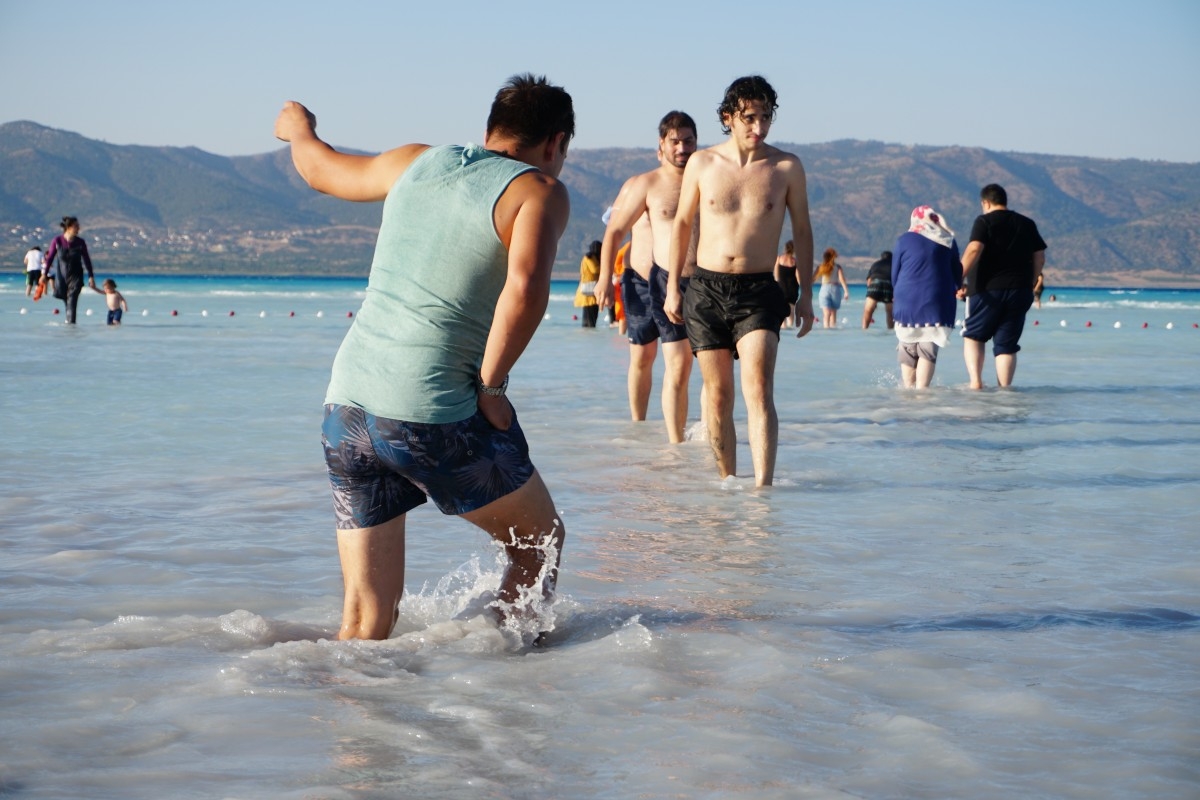
But it can also be very dangerous. Locals from Salda village told Middle East Eye that there have been a number of incidents where people have drowned in the lake. On 3 August, a 13-year-old Syrian boy drowned there, they said, and that wasn’t the first time it had happened. Turkey’s Environment and Urbanisation Minister Murat Kurum has recently prohibited swimming in Salda’s touristy “White Islands”. (MEE/Nimet Kirac)
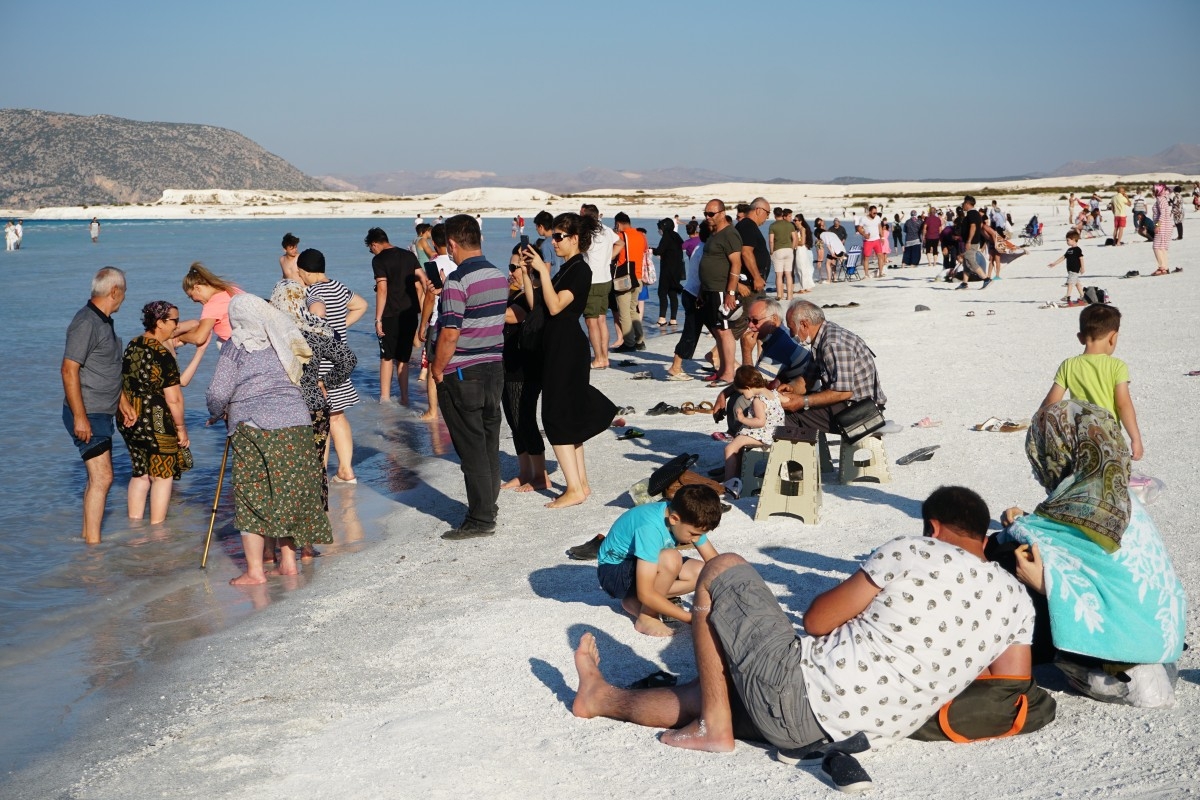
Environmentalists, including international and local conservation organisations, have been calling for restrictions to be placed on entering the site of the lake, which have become increasingly popular in the past few years. The number of cars entering the “White Beach” on a weekend tend to reach a few thousand, but many locals are also unhappy about this sudden interest too, which they say is fuelled by social media.
In late summer, Burdur governor Ali Arslantas announced that steps are being taken to limit the number of visitors onto the site, following meetings between local officials, members of NGOs, academics and representatives from the tourism industry. (MEE/Nimet Kirac)
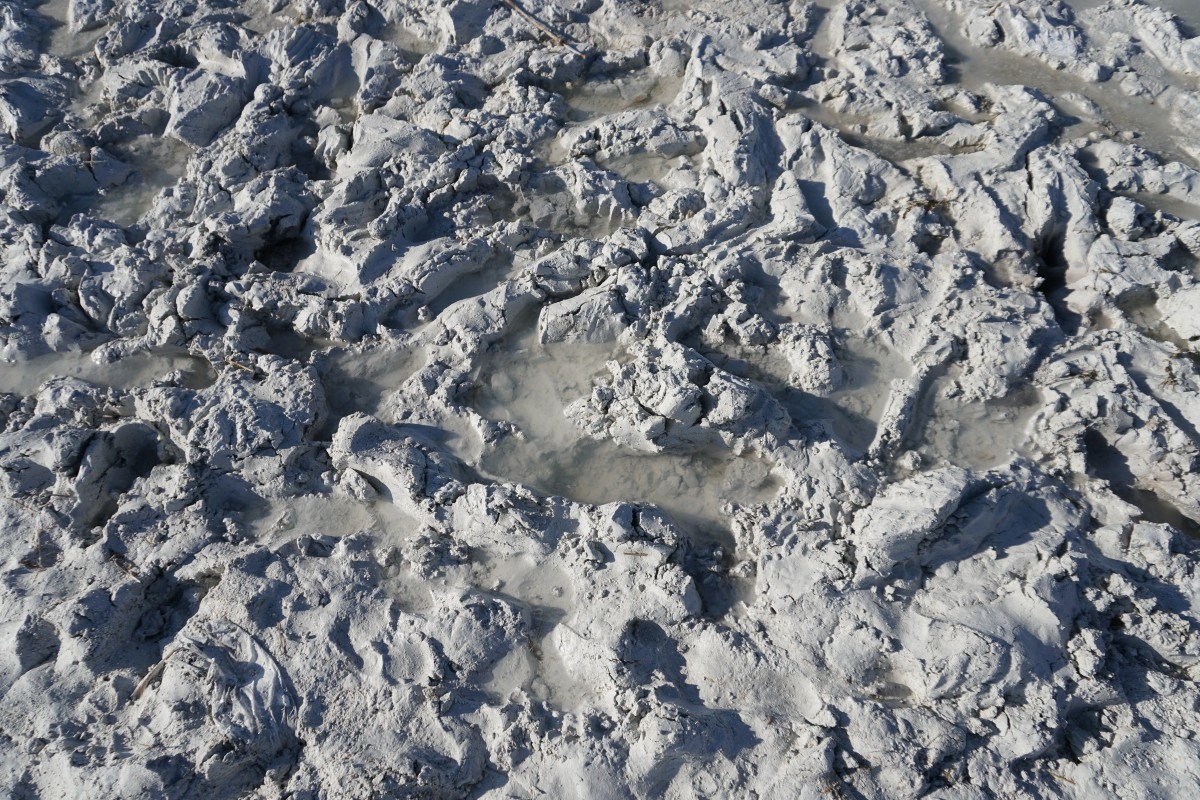
So far, tourism has brought destruction to Salda, a first-degree natural conservation site since 1989. In early August, authorities marked areas dug up by visitors who sought to bathe in clay after local media reports criticised the situation at the heritage site, prompting the governor’s office to announce that visitors who steal clay from Salda would be fined.
Yet bathing remains a smaller environmental worry, compared to plans by the Turkish state constructor to build a recreational facility dubbed the “Nation’s Garden” in two separate sites around the lake. (MEE/Nimet Kirac)
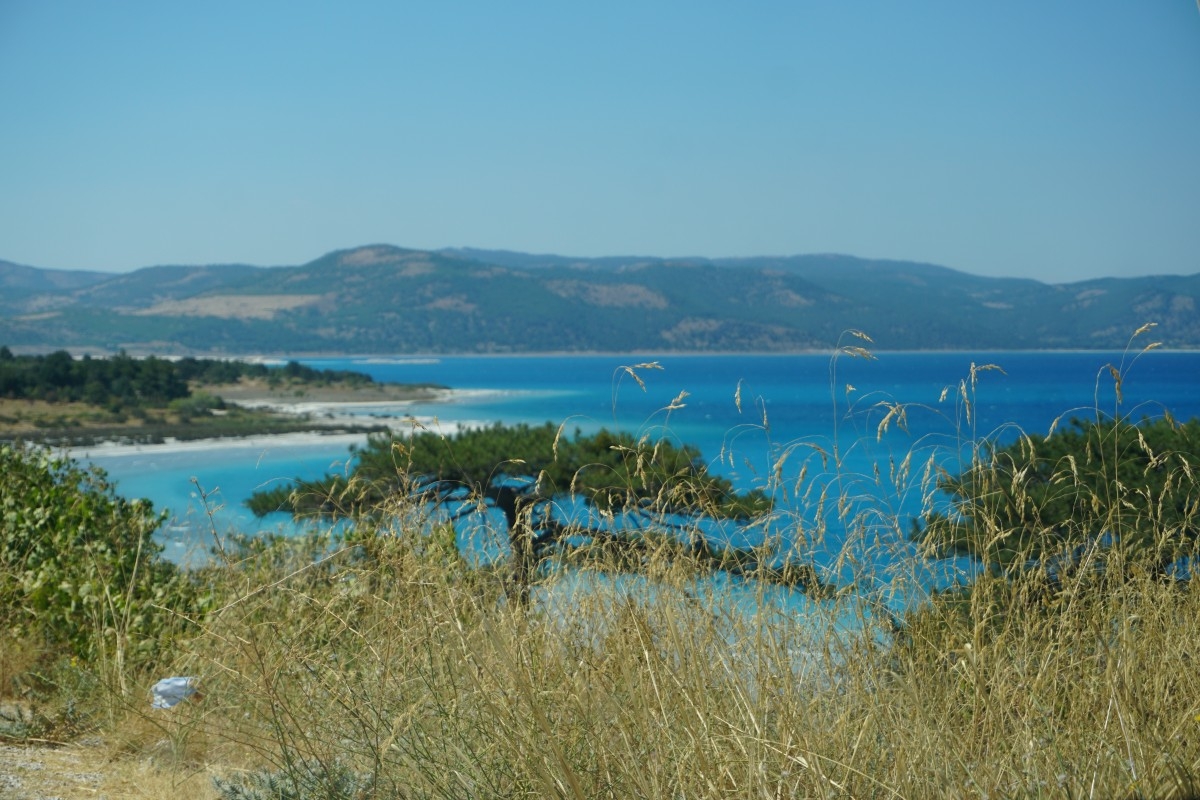
According to Gazi Osman Sakar, founder and president of the local conservation group Protect Lake Salda, this project will cause visitors to spend more time by the lake, posing an ecological threat, and should be cancelled. “They should consult scientists on this,” says Sakar, who has filed a lawsuit along with four locals against the Environment and Urbanization Ministry.
The tender, worth over 21 million Turkish liras ($2.8m), quickly became a topic of controversy politically, and was slammed by the main opposition Republican People’s Party (CHP) as well as various environmental groups, including Don’t Touch My Salda Lake, a local initiative founded in 2019. Although the tender was postponed briefly in August 2019, it was later approved by an administrative court and in April construction vehicles seen to be carrying white clay between shores sparked protests. (MEE/Nimet Kirac)
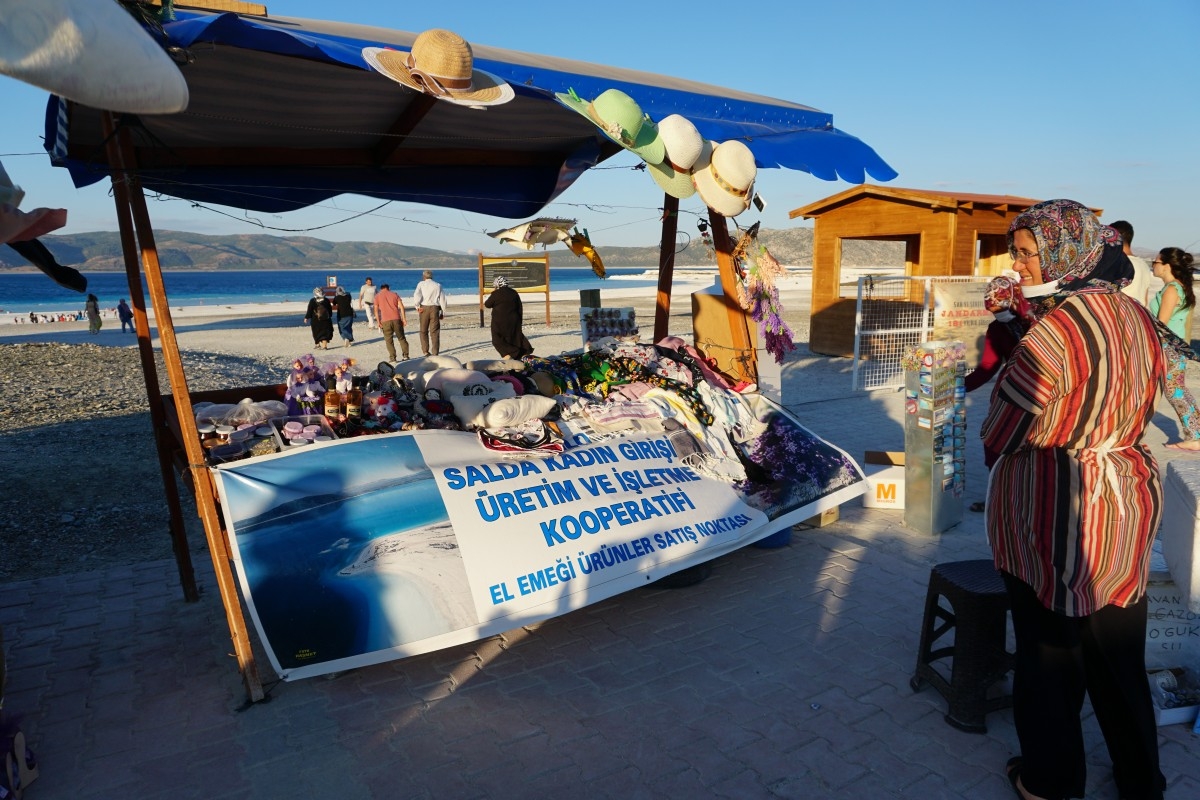
“If they build a Nation’s Garden here and attract more visitors, the end of this place will be like that of Uzungol’s,” Cennet Yildiz, visiting from western Usak province, said, referring to the natural lake situated in the Black Sea province of Trabzon, now surrounded by manmade structures and hotels. “It’s sad to have lost Uzungol to construction,” Yildiz said. (MEE/Nimet Kirac)
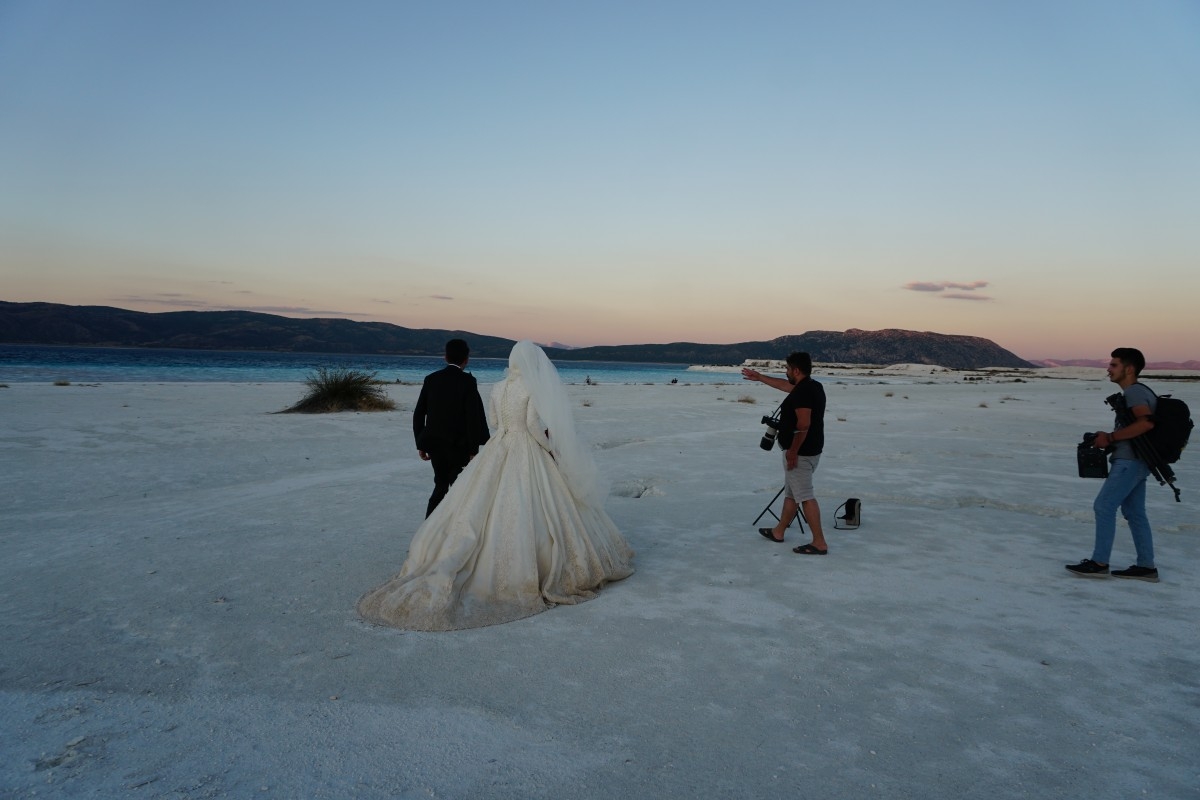
Burdur’s lakes region, and Salda in particular, is also a favoured wedding photography location, situated at 1,193 metres above sea level and tucked between valleys surrounded by forests. A newly-wed couple from the northeastern Black Sea province of Artvin said this is why they came here. “The view is great, all natural,” said Cemal Ozkurt, who just married his sweetheart (above), treading carefully on the hard ground with the turquoise lake in the backdrop. (MEE/Nimet Kirac)
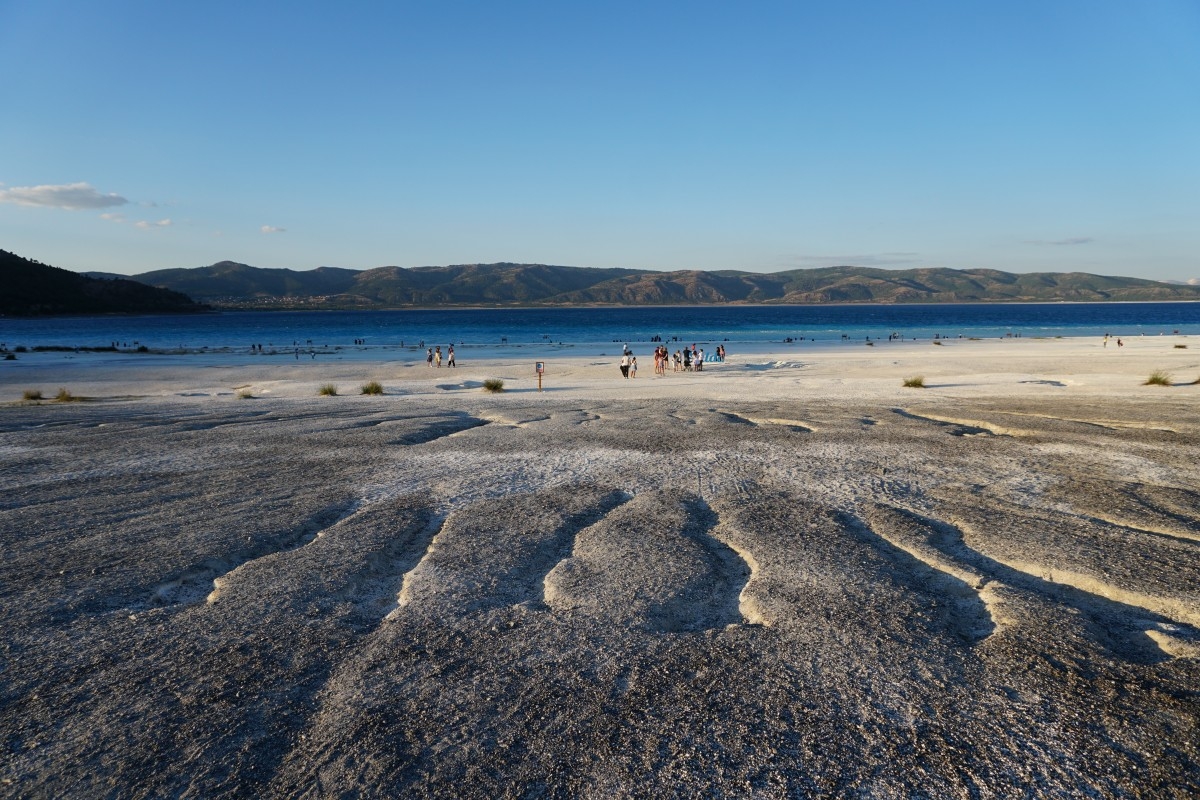
“If each visitor takes away a single drop, then this lake will dry very quickly,” says Halil Ibrahim Sonmez, a 46-year-old local gift seller from the nearby Salda village, who recalls his parents' stories of how much wider Lake Salda used to be. “I don’t know about Mars, but I know about Lake Salda,” Sonmez, originally a farmer who now sells lavender-based local goods to visitors, said.
“Here, it’s heaven,” he says, and describes how the site is surrounded by lush, lavender fields. In the winter, its shores are carpeted in snow, yet the lake never freezes, he adds, calling on officials to “either do this tourism business with integrity, or not at all.” (MEE/Nimet Kirac)
Meanwhile, the governor’s office contested reports documented by environmentalist groups showing cesspools by Salda, saying the lake’s water is regularly tested and passes for the highest quality, drinkable water. But the Organization to Protect Lake Salda disputed this, and challenged officials to drink from the lake.
The quality of the water matters a great deal for NASA’s studies on the lake, Balci said: “The lake water has a rare geochemical balance which creates perfect conditions for microorganisms unique to the lake and helps stromatolites growth. This should be protected.” (MEE/Nimet Kirac)
Middle East Eye propose une couverture et une analyse indépendantes et incomparables du Moyen-Orient, de l’Afrique du Nord et d’autres régions du monde. Pour en savoir plus sur la reprise de ce contenu et les frais qui s’appliquent, veuillez remplir ce formulaire [en anglais]. Pour en savoir plus sur MEE, cliquez ici [en anglais].


